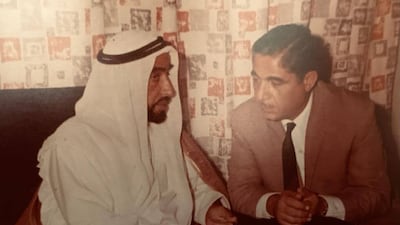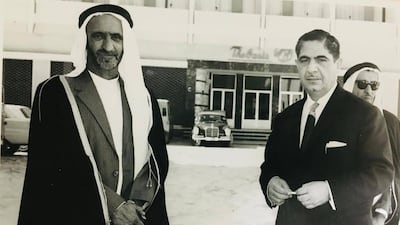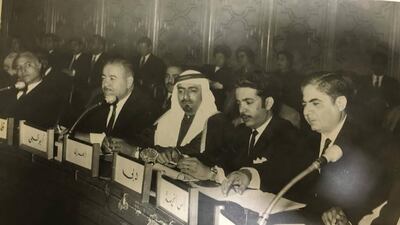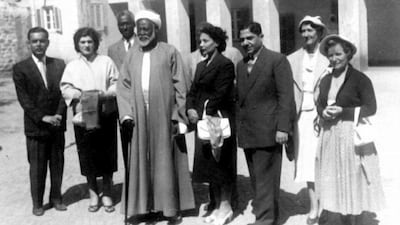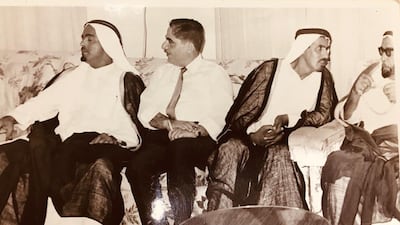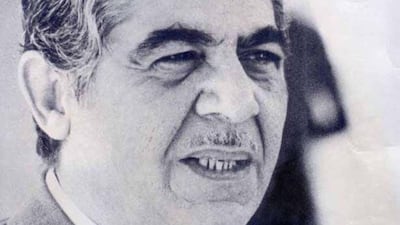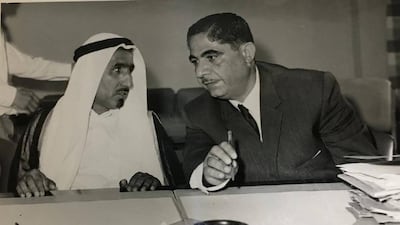Their names are rightly celebrated for the part they played in helping the Founding Fathers build the country we know today as the United Arab Emirates.
Figures such as Adnan Pachachi, the adviser to UAE Founding Father, the late Sheikh Zayed bin Sultan Al Nahyan, who became the first UN ambassador, Dr Abdul Makhlouf, architect of the modern city of Abu Dhabi, and Zaki Nusseibeh, who has had a long and distinguished career as cultural adviser to two Presidents and Minister of State.
But what of Adi Bitar, whose work after more than 50 years, still shapes the daily lives of everyone who lives here?
The author of the Constitution of the UAE, the enormity of his achievement is perhaps concealed by the modesty of his personality, but also the result of a life cut tragically short.
He was a modest man and not the type of person to boast about what he had done. Even when other people took credit for his work, he didn’t mind
Omar Al Bitar
Even for group photographs, “my father would just walk away”, his son Omar Al Bitar says.
“He was a modest man and not the type of person to boast about what he had done. Even when other people took credit for his work, he didn’t mind.”
Yet thanks to Bitar, the seven desert emirates, once ruled largely by tribal convention and cultural traditions, became a modern nation of laws.
In the words that he penned, “Equality, social justice, safety, security and equal opportunities for all citizens shall be the pillars of the society.”
Yet he barely saw the UAE beyond its birth in 1971, dying of cancer just two years later at the age of 48. He is buried beside his 10-year-old son, Issa, struck down by leukaemia only three months earlier.
Early life and escape from Zionist bombing
Bitar was born in Jerusalem, on December 7, 1924. His father, Nasib Al Bitar, was a distinguished judge who had studied at Cairo’s Al Azar University and later served in the First World War as an officer in the Ottoman Empire, of which Palestine was then a region.
By the time of Bitar’s birth, Jerusalem was under the control of the British Mandate, and he was educated first at the multi-denominational Terra Sancta School and then at the Palestinian Institute of Law where he graduated with honours in 1942.
By then tensions were growing between the British authorities, Palestinian Arabs and Jewish settlers, whose number was increasing rapidly as they fled the aftermath of Hitler’s Germany at the end of the Second World War.
By now Bitar was gaining experience as a legal clerk and on the morning of July 22, 1946 found himself at the British administrative headquarters at the King David Hotel, overlooking Jerusalem’s Old City.
At 12.37pm, the Zionist terrorist group, Irgun, detonated a massive bomb in the hotel’s basement. Bitar escaped the blast largely unscathed, but as he went back into the building to rescue the injured, a large part of the south wing collapsed, burying him alive.
Most were convinced he had been killed, but Bitar’s brother insisted otherwise. Eventually Bitar was dug out alive but with serious injuries, including broken bones. He lived only because a table had sheltered him from the worst of the falling rubble.
Two years later the British Mandate was over, and the State of Israel declared. In the war that followed, Jerusalem’s Old City and the entire West Bank came under Jordanian control, and it was as a citizen of Jordan that Bitar gained his reputation as a lawyer.
His quick mind and keen intelligence lead to a senior appointment at the Attorney General’s office, where he worked until 1956. An appointment to Sudan followed, as a district judge, returning to Jerusalem three years later to set up a law practice.
Bitar’s life changed forever in 1964. Working for Sheikh Rashid bin Saeed Al Maktoum, the Ruler of Dubai, the British political agent for the Arabian Gulf approached the Jordanians.
They were looking for a legal adviser to the government of Dubai who could develop a framework of laws that would help the emirate’s development to a modern economy, including a civil legal system and courts.
Bitar’s name was put forward and accepted. He moved to Dubai and immediately set to work on laws and regulations that would govern everything from the banking system to the new Dubai International Airport, Port Rashid, the establishment of Jebel Ali, and even the decree that switched driving to the right-hand side of the road.
In 1965 Bitar was appointed Secretary General and legal adviser to the Trucial States Council, a forum at which the Rulers of the seven emirates would meet to discuss areas of mutual interest.
The post allowed other Rulers to know Bitar better, especially Sheikh Zayed, then Ruler of Abu Dhabi, and with Sheikh Rashid the major player in plans to create the Union of Arab Emirates.
The deciding moment came in February 1968, with a meeting between Sheikh Zayed and Sheikh Rashid in the desert at Seih Al Sedira, on the border of Abu Dhabi and Dubai.
A decision was made to create a new country from the seven emirates, and with it a number of practical decisions, including the pressing need to draft a constitution.
Bitar, a familiar and well-liked figure, was the obvious choice.
He worked long hours to complete the task, from his offices at the Government of Dubai and Trucial States Council, then later in the day from the quiet of his home in Dubai, using the dining room table.
His son, Omar, would act as his father’s driver and assistant during this time, and remembers taking pages to be typed and then copied on a mimeograph machine, the precursor of photocopiers.
The finished document, with 152 articles, and in the words of the Government “establishing the basis of the UAE and the rights of citizens in ten areas” was completed in time for December 2, 1971.
Some elements were intended to be temporary, including Abu Dhabi as the capital, with provision for a new city at Karama on the Dubai border, but this was abandoned and the constitution finally made permanent in May, 1996.
For Bitar, the future seemed to be continuing his distinguish career in the service of the UAE as a senior adviser both to the UAE cabinet and the Prime Minister, at that time Sheikh Maktoum bin Rashid. It was not to be.
His youngest son, Issa, was diagnosed with leukaemia, with treatment in Lebanon, the UK and Dubai. It was during this period that Bitar told his family he needed to visit Britain, on a working trip to discuss the printing of UAE passports.
In fact Bitar was also unwell. In London, he arranged to see a consultant and was diagnosed with stage 4 liver cancer. At one point the treatment, at the American Hospital in Beirut and in Dubai, seemed to be achieving some results, but in January 1973, Issa died, his father at his side. He was 10.
Issa’s death seemed to break Bitar. His own health declined rapidly, and in March 1973 he also died, to be buried by his son’s side.
His wife and surviving children remained in the UAE, becoming citizens of the country Bitar had helped to create.
Of his surviving sons, Nasib, who died in 2011, was a documentary writer and senior figure at Dubai Television, where he was director of programming, and creator of Alarabiya Productions, where he created the series The Last Cavalier.
Omar Al Bitar rose to become a major general in the UAE Armed Forces, vice president of the Sorbonne University Abu Dhabi, then ambassador to China and vice president of the Emirates Diplomatic Academy.
Of his father, he says: “He was a man of vision, a man of ethics. He would discuss with you any matter. He had a depth of knowledge. He was a man of calibre and integrity.”
BUNDESLIGA FIXTURES
Saturday, May 16 (kick-offs UAE time)
Borussia Dortmund v Schalke (4.30pm)
RB Leipzig v Freiburg (4.30pm)
Hoffenheim v Hertha Berlin (4.30pm)
Fortuna Dusseldorf v Paderborn (4.30pm)
Augsburg v Wolfsburg (4.30pm)
Eintracht Frankfurt v Borussia Monchengladbach (7.30pm)
Sunday, May 17
Cologne v Mainz (4.30pm),
Union Berlin v Bayern Munich (7pm)
Monday, May 18
Werder Bremen v Bayer Leverkusen (9.30pm)
Company%20profile%20
%3Cp%3E%3Cstrong%3EName%3A%20%3C%2Fstrong%3EYodawy%3Cbr%3E%3Cstrong%3EBased%3A%3C%2Fstrong%3E%20Egypt%3Cbr%3E%3Cstrong%3EFounders%3A%20%3C%2Fstrong%3EKarim%20Khashaba%2C%20Sherief%20El-Feky%20and%20Yasser%20AbdelGawad%3Cstrong%3E%3Cbr%3ESector%3A%20%3C%2Fstrong%3EHealthTech%3Cbr%3E%3Cstrong%3ETotal%20funding%3A%20%3C%2Fstrong%3E%2424.5%20million%3Cbr%3E%3Cstrong%3EInvestors%3A%20%3C%2Fstrong%3EAlgebra%20Ventures%2C%20Global%20Ventures%2C%20MEVP%20and%20Delivery%20Hero%20Ventures%2C%20among%20others%3Cstrong%3E%3Cbr%3ENumber%20of%20employees%3A%3C%2Fstrong%3E%20500%3Cbr%3E%3C%2Fp%3E%0A
PAKISTAN SQUAD
Abid Ali, Fakhar Zaman, Imam-ul-Haq, Shan Masood, Azhar Ali (test captain), Babar Azam (T20 captain), Asad Shafiq, Fawad Alam, Haider Ali, Iftikhar Ahmad, Khushdil Shah, Mohammad Hafeez, Shoaib Malik, Mohammad Rizwan (wicketkeeper), Sarfaraz Ahmed (wicketkeeper), Faheem Ashraf, Haris Rauf, Imran Khan, Mohammad Abbas, Mohammad Hasnain, Naseem Shah, Shaheen Afridi, Sohail Khan, Usman Shinwari, Wahab Riaz, Imad Wasim, Kashif Bhatti, Shadab Khan and Yasir Shah.
SPEC%20SHEET%3A%20APPLE%20M3%20MACBOOK%20AIR%20(13%22)
%3Cp%3E%3Cstrong%3EProcessor%3A%3C%2Fstrong%3E%20Apple%20M3%2C%208-core%20CPU%2C%20up%20to%2010-core%20CPU%2C%2016-core%20Neural%20Engine%3C%2Fp%3E%0A%3Cp%3E%3Cstrong%3EDisplay%3A%3C%2Fstrong%3E%2013.6-inch%20Liquid%20Retina%2C%202560%20x%201664%2C%20224ppi%2C%20500%20nits%2C%20True%20Tone%2C%20wide%20colour%3C%2Fp%3E%0A%3Cp%3E%3Cstrong%3EMemory%3A%3C%2Fstrong%3E%208%2F16%2F24GB%3C%2Fp%3E%0A%3Cp%3E%3Cstrong%3EStorage%3A%3C%2Fstrong%3E%20256%2F512GB%20%2F%201%2F2TB%3C%2Fp%3E%0A%3Cp%3E%3Cstrong%3EI%2FO%3A%3C%2Fstrong%3E%20Thunderbolt%203%2FUSB-4%20(2)%2C%203.5mm%20audio%2C%20Touch%20ID%3C%2Fp%3E%0A%3Cp%3E%3Cstrong%3EConnectivity%3A%3C%2Fstrong%3E%20Wi-Fi%206E%2C%20Bluetooth%205.3%3C%2Fp%3E%0A%3Cp%3E%3Cstrong%3EBattery%3A%3C%2Fstrong%3E%2052.6Wh%20lithium-polymer%2C%20up%20to%2018%20hours%2C%20MagSafe%20charging%3C%2Fp%3E%0A%3Cp%3E%3Cstrong%3ECamera%3A%3C%2Fstrong%3E%201080p%20FaceTime%20HD%3C%2Fp%3E%0A%3Cp%3E%3Cstrong%3EVideo%3A%3C%2Fstrong%3E%20Support%20for%20Apple%20ProRes%2C%20HDR%20with%20Dolby%20Vision%2C%20HDR10%3C%2Fp%3E%0A%3Cp%3E%3Cstrong%3EAudio%3A%3C%2Fstrong%3E%204-speaker%20system%2C%20wide%20stereo%2C%20support%20for%20Dolby%20Atmos%2C%20Spatial%20Audio%20and%20dynamic%20head%20tracking%20(with%20AirPods)%3C%2Fp%3E%0A%3Cp%3E%3Cstrong%3EColours%3A%3C%2Fstrong%3E%20Midnight%2C%20silver%2C%20space%20grey%2C%20starlight%3C%2Fp%3E%0A%3Cp%3E%3Cstrong%3EIn%20the%20box%3A%3C%2Fstrong%3E%20MacBook%20Air%2C%2030W%2F35W%20dual-port%2F70w%20power%20adapter%2C%20USB-C-to-MagSafe%20cable%2C%202%20Apple%20stickers%3C%2Fp%3E%0A%3Cp%3E%3Cstrong%3EPrice%3A%3C%2Fstrong%3E%20From%20Dh4%2C599%3C%2Fp%3E%0A
3%20Body%20Problem
%3Cp%3E%3Cstrong%3ECreators%3A%3C%2Fstrong%3E%20David%20Benioff%2C%20D%20B%20Weiss%2C%20Alexander%20Woo%3C%2Fp%3E%0A%3Cp%3E%3Cstrong%3EStarring%3A%20%3C%2Fstrong%3EBenedict%20Wong%2C%20Jess%20Hong%2C%20Jovan%20Adepo%2C%20Eiza%20Gonzalez%2C%20John%20Bradley%2C%20Alex%20Sharp%3C%2Fp%3E%0A%3Cp%3E%3Cstrong%3ERating%3A%3C%2Fstrong%3E%203%2F5%3C%2Fp%3E%0A
VEZEETA PROFILE
Date started: 2012
Founder: Amir Barsoum
Based: Dubai, UAE
Sector: HealthTech / MedTech
Size: 300 employees
Funding: $22.6 million (as of September 2018)
Investors: Technology Development Fund, Silicon Badia, Beco Capital, Vostok New Ventures, Endeavour Catalyst, Crescent Enterprises’ CE-Ventures, Saudi Technology Ventures and IFC
The%20specs
%3Cp%3E%3Cstrong%3EEngine%3A%3C%2Fstrong%3E%201.8-litre%204-cyl%20turbo%0D%3Cbr%3E%3Cstrong%3EPower%3A%20%3C%2Fstrong%3E190hp%20at%205%2C200rpm%0D%3Cbr%3E%3Cstrong%3ETorque%3A%3C%2Fstrong%3E%20320Nm%20from%201%2C800-5%2C000rpm%0D%3Cbr%3E%3Cstrong%3ETransmission%3A%20%3C%2Fstrong%3ESeven-speed%20dual-clutch%20auto%0D%3Cbr%3E%3Cstrong%3EFuel%20consumption%3A%3C%2Fstrong%3E%206.7L%2F100km%0D%3Cbr%3E%3Cstrong%3EPrice%3A%3C%2Fstrong%3E%20From%20Dh111%2C195%0D%3Cbr%3E%3Cstrong%3EOn%20sale%3A%20%3C%2Fstrong%3ENow%3C%2Fp%3E%0A
Kanye%20West
%3Cp%3EYe%20%E2%80%94%20the%20rapper%20formerly%20known%20as%20Kanye%20West%20%E2%80%94%20has%20seen%20his%20net%20worth%20fall%20to%20%24400%20million%20in%20recent%20weeks.%20That%E2%80%99s%20a%20precipitous%20drop%20from%20Bloomberg%E2%80%99s%20estimates%20of%20%246.8%20billion%20at%20the%20end%20of%202021.%3Cbr%3EYe%E2%80%99s%20wealth%20plunged%20after%20business%20partners%2C%20including%20Adidas%2C%20severed%20ties%20with%20him%20on%20the%20back%20of%20anti-Semitic%20remarks%20earlier%20this%20year.%3Cbr%3EWest%E2%80%99s%20present%20net%20worth%20derives%20from%20cash%2C%20his%20music%2C%20real%20estate%20and%20a%20stake%20in%20former%20wife%20Kim%20Kardashian%E2%80%99s%20shapewear%20firm%2C%20Skims.%3C%2Fp%3E%0A
Silent Hill f
Publisher: Konami
Platforms: PlayStation 5, Xbox Series X/S, PC
Rating: 4.5/5
Labour dispute
The insured employee may still file an ILOE claim even if a labour dispute is ongoing post termination, but the insurer may suspend or reject payment, until the courts resolve the dispute, especially if the reason for termination is contested. The outcome of the labour court proceedings can directly affect eligibility.
- Abdullah Ishnaneh, Partner, BSA Law
'Worse than a prison sentence'
Marie Byrne, a counsellor who volunteers at the UAE government's mental health crisis helpline, said the ordeal the crew had been through would take time to overcome.
“It was worse than a prison sentence, where at least someone can deal with a set amount of time incarcerated," she said.
“They were living in perpetual mystery as to how their futures would pan out, and what that would be.
“Because of coronavirus, the world is very different now to the one they left, that will also have an impact.
“It will not fully register until they are on dry land. Some have not seen their young children grow up while others will have to rebuild relationships.
“It will be a challenge mentally, and to find other work to support their families as they have been out of circulation for so long. Hopefully they will get the care they need when they get home.”
How has net migration to UK changed?
The figure was broadly flat immediately before the Covid-19 pandemic, standing at 216,000 in the year to June 2018 and 224,000 in the year to June 2019.
It then dropped to an estimated 111,000 in the year to June 2020 when restrictions introduced during the pandemic limited travel and movement.
The total rose to 254,000 in the year to June 2021, followed by steep jumps to 634,000 in the year to June 2022 and 906,000 in the year to June 2023.
The latest available figure of 728,000 for the 12 months to June 2024 suggests levels are starting to decrease.
Top 5 concerns globally:
1. Unemployment
2. Spread of infectious diseases
3. Fiscal crises
4. Cyber attacks
5. Profound social instability
Top 5 concerns in the Mena region
1. Energy price shock
2. Fiscal crises
3. Spread of infectious diseases
4. Unmanageable inflation
5. Cyber attacks
Source: World Economic Foundation
Terror attacks in Paris, November 13, 2015
- At 9.16pm, three suicide attackers killed one person outside the Atade de France during a foootball match between France and Germany
- At 9.25pm, three attackers opened fire on restaurants and cafes over 20 minutes, killing 39 people
- Shortly after 9.40pm, three other attackers launched a three-hour raid on the Bataclan, in which 1,500 people had gathered to watch a rock concert. In total, 90 people were killed
- Salah Abdeslam, the only survivor of the terrorists, did not directly participate in the attacks, thought to be due to a technical glitch in his suicide vest
- He fled to Belgium and was involved in attacks on Brussels in March 2016. He is serving a life sentence in France
Lexus LX700h specs
Engine: 3.4-litre twin-turbo V6 plus supplementary electric motor
Power: 464hp at 5,200rpm
Torque: 790Nm from 2,000-3,600rpm
Transmission: 10-speed auto
Fuel consumption: 11.7L/100km
On sale: Now
Price: From Dh590,000
Living in...
This article is part of a guide on where to live in the UAE. Our reporters will profile some of the country’s most desirable districts, provide an estimate of rental prices and introduce you to some of the residents who call each area home.
The specs: 2018 Infiniti QX80
Price: base / as tested: Dh335,000
Engine: 5.6-litre V8
Gearbox: Seven-speed automatic
Power: 400hp @ 5,800rpm
Torque: 560Nm @ 4,000rpm
Fuel economy, combined: 12.1L / 100km
THE%20SPECS
%3Cp%3EBattery%3A%2060kW%20lithium-ion%20phosphate%3Cbr%3EPower%3A%20Up%20to%20201bhp%3Cbr%3E0%20to%20100kph%3A%207.3%20seconds%3Cbr%3ERange%3A%20418km%3Cbr%3EPrice%3A%20From%20Dh149%2C900%3Cbr%3EAvailable%3A%20Now%3C%2Fp%3E%0A
THE BIO
Born: Mukalla, Yemen, 1979
Education: UAE University, Al Ain
Family: Married with two daughters: Asayel, 7, and Sara, 6
Favourite piece of music: Horse Dance by Naseer Shamma
Favourite book: Science and geology
Favourite place to travel to: Washington DC
Best advice you’ve ever been given: If you have a dream, you have to believe it, then you will see it.
Real estate tokenisation project
Dubai launched the pilot phase of its real estate tokenisation project last month.
The initiative focuses on converting real estate assets into digital tokens recorded on blockchain technology and helps in streamlining the process of buying, selling and investing, the Dubai Land Department said.
Dubai’s real estate tokenisation market is projected to reach Dh60 billion ($16.33 billion) by 2033, representing 7 per cent of the emirate’s total property transactions, according to the DLD.
The specs
Engine: 3.0-litre six-cylinder turbo
Power: 398hp from 5,250rpm
Torque: 580Nm at 1,900-4,800rpm
Transmission: Eight-speed auto
Fuel economy, combined: 6.5L/100km
On sale: December
Price: From Dh330,000 (estimate)
Quick pearls of wisdom
Focus on gratitude: And do so deeply, he says. “Think of one to three things a day that you’re grateful for. It needs to be specific, too, don’t just say ‘air.’ Really think about it. If you’re grateful for, say, what your parents have done for you, that will motivate you to do more for the world.”
Know how to fight: Shetty married his wife, Radhi, three years ago (he met her in a meditation class before he went off and became a monk). He says they’ve had to learn to respect each other’s “fighting styles” – he’s a talk it-out-immediately person, while she needs space to think. “When you’re having an argument, remember, it’s not you against each other. It’s both of you against the problem. When you win, they lose. If you’re on a team you have to win together.”
LILO & STITCH
Starring: Sydney Elizebeth Agudong, Maia Kealoha, Chris Sanders
Director: Dean Fleischer Camp
Rating: 4.5/5
Central%20Bank's%20push%20for%20a%20robust%20financial%20infrastructure
%3Cul%3E%0A%3Cli%3ECBDC%20real-value%20pilot%20held%20with%20three%20partner%20institutions%26nbsp%3B%3C%2Fli%3E%0A%3Cli%3EPreparing%20buy%20now%2C%20pay%20later%20regulations%26nbsp%3B%3C%2Fli%3E%0A%3Cli%3EPreparing%20for%20the%202023%20launch%20of%20the%20domestic%20card%20initiative%26nbsp%3B%3C%2Fli%3E%0A%3Cli%3EPhase%20one%20of%20the%20Financial%20Infrastructure%20Transformation%20(FiT)%20completed%3C%2Fli%3E%0A%3C%2Ful%3E%0A
Fixture and table
UAE finals day: Friday, April 13 at Rugby Park, Dubai Sports City
- 3pm, UAE Conference: Dubai Tigers v Sharjah Wanderers
- 6.30pm, UAE Premiership: Dubai Exiles v Abu Dhabi Harlequins
UAE Premiership – final standings
- Dubai Exiles
- Abu Dhabi Harlequins
- Jebel Ali Dragons
- Dubai Hurricanes
- Dubai Sports City Eagles
- Abu Dhabi Saracens
Champion%20v%20Champion%20(PFL%20v%20Bellator)
%3Cp%3EHeavyweight%3A%20Renan%20Ferreira%20v%20Ryan%20Bader%20%3Cbr%3EMiddleweight%3A%20Impa%20Kasanganay%20v%20Johnny%20Eblen%3Cbr%3EFeatherweight%3A%20Jesus%20Pinedo%20v%20Patricio%20Pitbull%3Cbr%3ECatchweight%3A%20Ray%20Cooper%20III%20v%20Jason%20Jackson%3Cbr%3E%3C%2Fp%3E%0A%3Cp%3E%3Cstrong%3EShowcase%20Bouts%3C%2Fstrong%3E%3Cbr%3EHeavyweight%3A%20Bruno%20Cappelozza%20(former%20PFL%20World%20champ)%20v%20Vadim%20Nemkov%20(former%20Bellator%20champ)%3Cbr%3ELight%20Heavyweight%3A%20Thiago%20Santos%20(PFL%20title%20contender)%20v%20Yoel%20Romero%20(Bellator%20title%20contender)%3Cbr%3ELightweight%3A%20Clay%20Collard%20(PFL%20title%20contender)%20v%20AJ%20McKee%20(former%20Bellator%20champ)%3Cbr%3EFeatherweight%3A%20Gabriel%20Braga%20(PFL%20title%20contender)%20v%20Aaron%20Pico%20(Bellator%20title%20contender)%3Cbr%3ELightweight%3A%20Biaggio%20Ali%20Walsh%20(pro%20debut)%20v%20Emmanuel%20Palacios%20(pro%20debut)%3Cbr%3EWomen%E2%80%99s%20Lightweight%3A%20Claressa%20Shields%20v%20Kelsey%20DeSantis%3Cbr%3EFeatherweight%3A%20Abdullah%20Al%20Qahtani%20v%20Edukondal%20Rao%3Cbr%3EAmateur%20Flyweight%3A%20Malik%20Basahel%20v%20Vinicius%20Pereira%3C%2Fp%3E%0A
The specs
Engine: 2.0-litre 4cyl turbo
Power: 261hp at 5,500rpm
Torque: 405Nm at 1,750-3,500rpm
Transmission: 9-speed auto
Fuel consumption: 6.9L/100km
On sale: Now
Price: From Dh117,059
Specs
Engine: Duel electric motors
Power: 659hp
Torque: 1075Nm
On sale: Available for pre-order now
Price: On request
Company profile
Company name: Dharma
Date started: 2018
Founders: Charaf El Mansouri, Nisma Benani, Leah Howe
Based: Abu Dhabi
Sector: TravelTech
Funding stage: Pre-series A
Investors: Convivialite Ventures, BY Partners, Shorooq Partners, L& Ventures, Flat6Labs
War
Director: Siddharth Anand
Cast: Hrithik Roshan, Tiger Shroff, Ashutosh Rana, Vaani Kapoor
Rating: Two out of five stars
Profile of RentSher
Started: October 2015 in India, November 2016 in UAE
Founders: Harsh Dhand; Vaibhav and Purvashi Doshi
Based: Bangalore, India and Dubai, UAE
Sector: Online rental marketplace
Size: 40 employees
Investment: $2 million
JUDAS AND THE BLACK MESSIAH
Directed by: Shaka King
Starring: Daniel Kaluuya, Lakeith Stanfield, Jesse Plemons
Four stars
Gender equality in the workplace still 200 years away
It will take centuries to achieve gender parity in workplaces around the globe, according to a December report from the World Economic Forum.
The WEF study said there had been some improvements in wage equality in 2018 compared to 2017, when the global gender gap widened for the first time in a decade.
But it warned that these were offset by declining representation of women in politics, coupled with greater inequality in their access to health and education.
At current rates, the global gender gap across a range of areas will not close for another 108 years, while it is expected to take 202 years to close the workplace gap, WEF found.
The Geneva-based organisation's annual report tracked disparities between the sexes in 149 countries across four areas: education, health, economic opportunity and political empowerment.
After years of advances in education, health and political representation, women registered setbacks in all three areas this year, WEF said.
Only in the area of economic opportunity did the gender gap narrow somewhat, although there is not much to celebrate, with the global wage gap narrowing to nearly 51 per cent.
And the number of women in leadership roles has risen to 34 per cent globally, WEF said.
At the same time, the report showed there are now proportionately fewer women than men participating in the workforce, suggesting that automation is having a disproportionate impact on jobs traditionally performed by women.
And women are significantly under-represented in growing areas of employment that require science, technology, engineering and mathematics skills, WEF said.
* Agence France Presse
ANDROID%20VERSION%20NAMES%2C%20IN%20ORDER
%3Cp%3EAndroid%20Alpha%3C%2Fp%3E%0A%3Cp%3EAndroid%20Beta%3C%2Fp%3E%0A%3Cp%3EAndroid%20Cupcake%3C%2Fp%3E%0A%3Cp%3EAndroid%20Donut%3C%2Fp%3E%0A%3Cp%3EAndroid%20Eclair%3C%2Fp%3E%0A%3Cp%3EAndroid%20Froyo%3C%2Fp%3E%0A%3Cp%3EAndroid%20Gingerbread%3C%2Fp%3E%0A%3Cp%3EAndroid%20Honeycomb%3C%2Fp%3E%0A%3Cp%3EAndroid%20Ice%20Cream%20Sandwich%3C%2Fp%3E%0A%3Cp%3EAndroid%20Jelly%20Bean%3C%2Fp%3E%0A%3Cp%3EAndroid%20KitKat%3C%2Fp%3E%0A%3Cp%3EAndroid%20Lollipop%3C%2Fp%3E%0A%3Cp%3EAndroid%20Marshmallow%3C%2Fp%3E%0A%3Cp%3EAndroid%20Nougat%3C%2Fp%3E%0A%3Cp%3EAndroid%20Oreo%3C%2Fp%3E%0A%3Cp%3EAndroid%20Pie%3C%2Fp%3E%0A%3Cp%3EAndroid%2010%20(Quince%20Tart*)%3C%2Fp%3E%0A%3Cp%3EAndroid%2011%20(Red%20Velvet%20Cake*)%3C%2Fp%3E%0A%3Cp%3EAndroid%2012%20(Snow%20Cone*)%3C%2Fp%3E%0A%3Cp%3EAndroid%2013%20(Tiramisu*)%3C%2Fp%3E%0A%3Cp%3EAndroid%2014%20(Upside%20Down%20Cake*)%3C%2Fp%3E%0A%3Cp%3EAndroid%2015%20(Vanilla%20Ice%20Cream*)%3C%2Fp%3E%0A%3Cp%3E%3Cem%3E*%20internal%20codenames%3C%2Fem%3E%3C%2Fp%3E%0A
SUZUME
%3Cp%3EDirector%3A%20Makoto%20Shinkai%3C%2Fp%3E%0A%3Cp%3EStars%3A%20Nanoka%20Hara%2C%20Hokuto%20Matsumura%2C%20Eri%20Fukatsu%3C%2Fp%3E%0A%3Cp%3ERating%3A%204%2F5%3C%2Fp%3E%0A
Electric scooters: some rules to remember
- Riders must be 14-years-old or over
- Wear a protective helmet
- Park the electric scooter in designated parking lots (if any)
- Do not leave electric scooter in locations that obstruct traffic or pedestrians
- Solo riders only, no passengers allowed
- Do not drive outside designated lanes
UAE currency: the story behind the money in your pockets
yallacompare profile
Date of launch: 2014
Founder: Jon Richards, founder and chief executive; Samer Chebab, co-founder and chief operating officer, and Jonathan Rawlings, co-founder and chief financial officer
Based: Media City, Dubai
Sector: Financial services
Size: 120 employees
Investors: 2014: $500,000 in a seed round led by Mulverhill Associates; 2015: $3m in Series A funding led by STC Ventures (managed by Iris Capital), Wamda and Dubai Silicon Oasis Authority; 2019: $8m in Series B funding with the same investors as Series A along with Precinct Partners, Saned and Argo Ventures (the VC arm of multinational insurer Argo Group)
Key facilities
- Olympic-size swimming pool with a split bulkhead for multi-use configurations, including water polo and 50m/25m training lanes
- Premier League-standard football pitch
- 400m Olympic running track
- NBA-spec basketball court with auditorium
- 600-seat auditorium
- Spaces for historical and cultural exploration
- An elevated football field that doubles as a helipad
- Specialist robotics and science laboratories
- AR and VR-enabled learning centres
- Disruption Lab and Research Centre for developing entrepreneurial skills
COMPANY PROFILE
Name: Qyubic
Started: October 2023
Founder: Namrata Raina
Based: Dubai
Sector: E-commerce
Current number of staff: 10
Investment stage: Pre-seed
Initial investment: Undisclosed
COMPANY PROFILE
Name: Kumulus Water
Started: 2021
Founders: Iheb Triki and Mohamed Ali Abid
Based: Tunisia
Sector: Water technology
Number of staff: 22
Investment raised: $4 million
The specs
Engine: 2.0-litre 4-cyl turbo
Power: 201hp at 5,200rpm
Torque: 320Nm at 1,750-4,000rpm
Transmission: 6-speed auto
Fuel consumption: 8.7L/100km
Price: Dh133,900
On sale: now
COMPANY%20PROFILE%20
%3Cp%3E%3Cstrong%3EName%3A%3C%2Fstrong%3E%20Haltia.ai%0D%3Cbr%3E%3Cstrong%3EStarted%3A%3C%2Fstrong%3E%202023%0D%3Cbr%3E%3Cstrong%3ECo-founders%3A%3C%2Fstrong%3E%20Arto%20Bendiken%20and%20Talal%20Thabet%0D%3Cbr%3E%3Cstrong%3EBased%3A%3C%2Fstrong%3E%20Dubai%2C%20UAE%0D%3Cbr%3E%3Cstrong%3EIndustry%3A%3C%2Fstrong%3E%20AI%0D%3Cbr%3E%3Cstrong%3ENumber%20of%20employees%3A%3C%2Fstrong%3E%2041%0D%3Cbr%3E%3Cstrong%3EFunding%3A%3C%2Fstrong%3E%20About%20%241.7%20million%0D%3Cbr%3E%3Cstrong%3EInvestors%3A%3C%2Fstrong%3E%20Self%2C%20family%20and%20friends%26nbsp%3B%3C%2Fp%3E%0A
Skoda Superb Specs
Engine: 2-litre TSI petrol
Power: 190hp
Torque: 320Nm
Price: From Dh147,000
Available: Now
The years Ramadan fell in May


